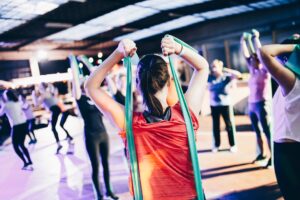The Importance of Physical Fitness Attitudes
Attitudes play a crucial role in physical fitness, influencing our beliefs, perceptions, and behaviors towards exercise and healthy living. Various factors shape these attitudes, including personal experiences, social norms, cultural beliefs, and media influence. Positive attitudes towards physical fitness often result in increased motivation to engage in regular exercise, make healthier food choices, and prioritize overall well-being.
Conversely, negative attitudes can impede the adoption of a healthy lifestyle and lead to a lack of motivation and commitment to physical fitness. Attitudes also impact self-efficacy, which is an individual’s belief in their ability to successfully perform a specific behavior. Those with positive attitudes towards exercise are more likely to believe in their capacity to adhere to a workout routine and achieve their fitness goals.
In contrast, individuals with negative attitudes may doubt their ability to make lasting changes and may be more prone to abandoning their fitness journey. Understanding the role of attitudes in physical fitness is essential for developing effective strategies to promote a positive mindset and encourage long-term adherence to healthy behaviors. By recognizing the impact of attitudes on physical fitness, individuals and health professionals can work towards fostering a more positive approach to exercise and overall well-being.
Key Takeaways
- Attitudes play a crucial role in shaping individuals’ commitment to physical fitness and exercise.
- Positive attitudes towards physical fitness can significantly improve exercise adherence and consistency.
- Engaging in physical fitness activities can have a positive impact on mental health, and attitudes play a key role in experiencing these benefits.
- Attitudes towards physical fitness can influence lifestyle choices, including diet, sleep, and stress management.
- Overcoming negative attitudes towards physical fitness is essential for long-term success and overall well-being.
The Impact of Attitudes on Exercise Adherence
The Influence of Positive Attitudes
Individuals with positive attitudes towards exercise are more likely to view physical activity as an enjoyable and rewarding experience, leading to higher levels of motivation and engagement. They perceive exercise as an integral part of their daily routine, making it easier for them to prioritize and commit to regular workouts.
The Consequences of Negative Attitudes
On the other hand, individuals with negative attitudes may view exercise as a chore or a burden, leading to lower levels of motivation and adherence. Moreover, negative attitudes can also affect the way we perceive barriers and challenges related to exercise, making individuals more prone to giving up when faced with difficulties.
Overcoming Barriers and Cultivating a Positive Mindset
Understanding the impact of attitudes on exercise adherence is crucial for developing interventions and support systems that can help individuals overcome barriers and cultivate a positive mindset towards fitness. By recognizing the importance of attitudes, we can work towards creating an environment that fosters a positive and resilient approach to exercise, ultimately leading to greater appreciation for the physical, mental, and emotional rewards of regular physical activity.
Attitudes and Mental Health Benefits of Physical Fitness
Attitudes towards physical fitness can also have a significant impact on mental health. Positive attitudes towards exercise are associated with lower levels of stress, anxiety, and depression, as well as higher levels of self-esteem and overall well-being. Individuals with positive attitudes are more likely to view exercise as a means of self-care and stress relief, leading to greater engagement in physical activity as a way to improve their mental health.
On the other hand, individuals with negative attitudes may be less inclined to prioritize exercise as a tool for mental well-being, potentially missing out on the mental health benefits of regular physical activity. Furthermore, attitudes can also influence the way we perceive our bodies and self-image. Positive attitudes towards physical fitness are linked to a healthier body image and greater body satisfaction, as individuals are more likely to focus on the functional and health-related benefits of exercise rather than solely on appearance.
Conversely, negative attitudes can lead to body dissatisfaction and a preoccupation with unrealistic body ideals, which can have detrimental effects on mental health. Understanding the relationship between attitudes and mental health benefits of physical fitness is essential for promoting a holistic approach to well-being that encompasses both physical and mental health.
The Influence of Attitudes on Lifestyle Choices
| Attitude | Lifestyle Choice |
|---|---|
| Positive attitude towards exercise | Regular physical activity |
| Negative attitude towards healthy eating | Poor dietary choices |
| Positive attitude towards environmental sustainability | Adopting eco-friendly habits |
| Negative attitude towards stress management | Unhealthy coping mechanisms |
Attitudes towards physical fitness can significantly influence lifestyle choices related to diet, sleep, stress management, and overall well-being. Individuals with positive attitudes are more likely to make healthier food choices, prioritize adequate sleep, and engage in stress-reducing activities, as they view these behaviors as complementary to their commitment to physical fitness. They are also more likely to adopt a holistic approach to well-being, recognizing the interconnectedness of various lifestyle factors and their impact on overall health.
On the other hand, individuals with negative attitudes may be less inclined to make healthy lifestyle choices, potentially leading to a sedentary lifestyle, poor dietary habits, and inadequate self-care practices. Moreover, attitudes can also impact our willingness to seek out information and resources related to healthy living. Individuals with positive attitudes are more likely to actively seek out knowledge about nutrition, sleep hygiene, and stress management in order to support their fitness goals.
They are also more open to trying new wellness practices and incorporating them into their daily routine. Conversely, individuals with negative attitudes may be less motivated to educate themselves about healthy living and may be resistant to making changes in their lifestyle. Understanding the influence of attitudes on lifestyle choices is crucial for promoting a comprehensive approach to health that goes beyond just physical fitness.
Overcoming Negative Attitudes Towards Physical Fitness
Overcoming negative attitudes towards physical fitness requires a multi-faceted approach that addresses both internal beliefs and external influences. One effective strategy is cognitive restructuring, which involves challenging and reframing negative thoughts and beliefs about exercise. This can be achieved through self-reflection, journaling, or working with a mental health professional to identify and reframe negative thought patterns.
Additionally, education and awareness about the benefits of physical fitness can help individuals re-evaluate their attitudes and develop a more positive mindset towards exercise. Another important aspect of overcoming negative attitudes is creating a supportive environment that encourages and reinforces positive behaviors. This can involve seeking out social support from friends, family members, or fitness communities who share similar goals and values.
Surrounding oneself with positive role models and influencers who embody a healthy lifestyle can also help shift attitudes towards physical fitness in a more positive direction. Additionally, setting realistic goals and celebrating small victories along the way can help build confidence and motivation, ultimately leading to a more positive attitude towards exercise.
Cultivating Positive Attitudes for Long-Term Fitness Success

Practicing Mindfulness and Self-Compassion
One effective strategy for cultivating positive attitudes is practicing mindfulness and self-compassion. Mindfulness techniques such as meditation, deep breathing exercises, or yoga can help individuals develop a greater awareness of their thoughts and emotions related to exercise. This can lead to a more balanced and compassionate attitude towards oneself and one’s fitness journey.
Focusing on Intrinsic Motivation
Another important aspect of cultivating positive attitudes is focusing on intrinsic motivation rather than external rewards. This involves identifying personal values and goals related to physical fitness that go beyond just appearance or performance. By connecting exercise with meaningful values such as health, vitality, or self-care, individuals can develop a deeper sense of purpose and fulfillment in their fitness journey.
Embracing a Growth Mindset
Additionally, embracing a growth mindset that views challenges as opportunities for learning and growth can help individuals develop resilience and perseverance in the face of obstacles. By adopting this mindset, individuals can shift their attitudes towards exercise from obligation to appreciation, leading to a more sustainable and enjoyable fitness journey.
The Role of Attitudes in Creating a Culture of Physical Fitness
Attitudes play a crucial role in creating a culture of physical fitness within communities, organizations, and society at large. Positive attitudes towards physical fitness can inspire others to adopt healthier behaviors and contribute to a supportive environment that promotes well-being. This can be achieved through leading by example and embodying the values of regular exercise, healthy living, and self-care.
By demonstrating the benefits of physical fitness through personal actions and behaviors, individuals can influence others to adopt similar attitudes and behaviors. Furthermore, promoting education and awareness about the benefits of physical fitness can help shift societal attitudes towards exercise in a more positive direction. This can involve advocating for policies and initiatives that support access to safe and inclusive opportunities for physical activity within communities.
Additionally, challenging societal norms and stereotypes related to body image, beauty standards, and athleticism can help create a more inclusive culture that celebrates diverse expressions of health and well-being. In conclusion, attitudes play a significant role in shaping our beliefs, behaviors, and perceptions towards physical fitness. Understanding the impact of attitudes on exercise adherence, mental health benefits, lifestyle choices, as well as strategies for overcoming negative attitudes and cultivating positive mindsets is essential for promoting long-term success in physical fitness.
Moreover, recognizing the role of attitudes in creating a culture of physical fitness within communities is crucial for fostering an environment that supports well-being for all individuals. By promoting positive attitudes towards physical fitness at both individual and societal levels, we can contribute to a healthier and more active world for generations to come.
Physical fitness attitudes are important for overall health and well-being. According to a related article on ranviervillamil.com, having a positive attitude towards physical fitness can lead to increased motivation, better adherence to exercise routines, and improved mental health. This highlights the importance of cultivating a positive mindset towards physical fitness in order to achieve long-term success in maintaining a healthy lifestyle.
FAQs
What are physical fitness attitudes?
Physical fitness attitudes refer to an individual’s beliefs, feelings, and behaviors towards physical activity, exercise, and overall health and wellness.
Why are physical fitness attitudes important?
Physical fitness attitudes are important because they can influence an individual’s motivation, commitment, and adherence to a regular exercise routine. Positive attitudes towards physical fitness can lead to improved physical and mental health outcomes.
How do physical fitness attitudes impact behavior?
An individual’s physical fitness attitudes can impact their behavior by influencing their willingness to engage in physical activity, their commitment to maintaining a healthy lifestyle, and their overall approach to exercise and fitness goals.
Can physical fitness attitudes change over time?
Yes, physical fitness attitudes can change over time based on personal experiences, education, and exposure to new information. Individuals can develop more positive attitudes towards physical fitness through education, support, and positive reinforcement.
What are the benefits of having positive physical fitness attitudes?
Having positive physical fitness attitudes can lead to increased motivation, improved self-esteem, better physical health, and a reduced risk of chronic diseases such as heart disease, diabetes, and obesity. Positive attitudes can also contribute to a more active and fulfilling lifestyle.














Post Comment
You must be logged in to post a comment.